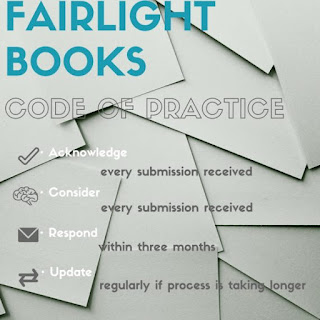The best part of Submissions... by Louise Boland
A couple of months ago I got a bee in my bonnet about how outrageously
writers are treated by many organisations who solicit for submissions. Why ask for them and then ignore them, was my
question. Perhaps they get too many to
handle? But then why not just close their
submissions process for a time until the backlog of responses has been worked
through?
As Katherine Roberts said to our call for advice, ‘yes is
brilliant, no is good (because you can cross that publisher/agent off your list
and move on), but silence is torture’.
I was determined that we would establish a submissions process
which shows respect for writers, and perhaps start a new trend out there –
setting the bar higher for all those organisations who seek direct manuscript
submissions.
So I asked for views on a submissions code of practice for
Fairlight Books and received many helpful suggestions and comments from Authors Electric et al. I’m
pleased to say that thanks to all the fantastic feedback we received, we now
have a workable, fair, and respectful code of practice up and running.
Here it is:
When we look at our submissions, I’m always very impressed by the care that writers take to read
through our guidelines and provide submissions in the form we have requested. Hopefully our new process will ensure that we always
respond in kind.
Much as I’d love to, we can’t publish all the many works we
receive, and if we did, then Fairlight Books wouldn’t be what I’d like it to be
– a place to nurture, publish and promote the best of quality writing.
But I’m very happy and excited to say that from our
submissions process we have signed up
a number of very talented writers, many of whom are debut writers of longer
fiction, and that we will be publishing their books in 2018. Please watch this space and on our website in
a couple of weeks, when we’ll start announcing details!
 |
| Fairlight Fiction - Coming Soon |

Comments
I had the glitteriest book launch via Simon & Schuster, back in 2002,for my Y/A novel: FOR MARITSA WITH LOVE, after which I saw most of my books going out of print, including the one they spent so much on launching - which is heart-breaking - it is a heart-breaking profession. One of my adult novels was enthusiastically taken up by Sheba Feminist Press back in the late 80s,but I disapproved of their ethics and withdrew it. Recently had an offer from Unbound for it which I haven't taken up because of the complexities and possible expense associated with it. There is a second.
I've kept going by doing small books for very young readers via Franklin Watts at Hachette - quite satisfying, because at least I'm out there. Why so many people seem to be queuing up to enter this profession baffles me, but they are. With my husband, David, we managed to re-publish much of my published work as ebooks, but I can't do the publicity, although I've tried. Also, sadly, David died four years ago.